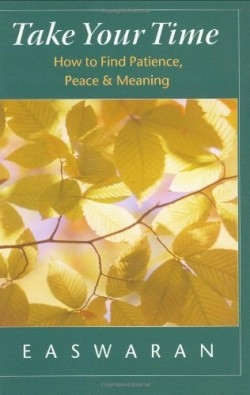It looks like you've stumbled upon a page meant to be read by our code instead of viewed directly. You're probably looking for this page.
Take Your Time
How to Find Patience, Peace & Meaning
- 2006 INDIES Winner
- Gold, Body, Mind & Spirit (Adult Nonfiction)
In today’s frenzy of multitasking, the quiet voice and wise counsel in this book present a refreshing alternative. The author invites readers for whom slowing down does not seem like an option to consider what is ultimately possible: “when the mind is still … You will return from this summit of spiritual awareness full of practical wisdom, passionate love, and untiring energy.”
Easwaran, a spiritual teacher 1910—1999), wrote twenty-six books in his lifetime, including a biography of Gandhi. Lessons from Gandhi’s life are among the anecdotes in this newly updated book. As Gandhi taught, much is accomplished by those with “one pointed attention.” Contrast that with the scattered mind that tries to do ten things simultaneously, none of them well.
Using stories and everyday images, Easwaran gently slows the reader down, instilling memorable life lessons instead of bulleted action items. He recounts his visit to a busy post office during the Christmas rush: “Inside was a scene of frustration.” He breaks the tension by letting the anxious fellow behind him move ahead in line. “The young woman at the counter … was making mistake after mistake … the more upset she got, the more mistakes she made.” When Easwaran took his turn at the window, he told her to take her time. Departing, he noted, “The whole room had relaxed a little … Pressure is contagious, but so is good will.”
Chapters on “Take Your Time,” “Slowing Down,” and “One Thing at a Time” apparently contradict the speed at which people feel they must function. Easwaran came to New York in the 1950s as a professor on a Fulbright grant. He thought he’d been set down in the middle of a road race. Things have speeded up considerably since.
At the end of the chapters are suggestions for slowing down, like: “When you catch yourself getting angry, observe your mind; see if you can catch it beginning to speed up.” This exercise cuts to the essence of the book: the hurried life and speeded-up mind cause tension and anger. Analogies like training the mind to switch channels as though using a television remote, driving, or being caught in a revolving door all ground the spiritual concepts in everyday reality. The latter half of the book focuses on balance, freedom, relationships, and the still center.
When he came to the United States, Easwaran was creating a step-by-step process for living mindfully, combining strengths of Eastern and Western traditions. These principles of meditation became his Eight-Point Program, detailed among the book’s additional resources.
This is a welcome precursor to meditation guides and will be accessible to a wide audience. Nilgiri Press and Christine Easwaran the late author’s wife and Nilgiri’s editorial director) are keeping these teachings vital for all those seeking a sense of peace and antidote to frantic lives.
Disclosure: This article is not an endorsement, but a review. The publisher of this book provided free copies of the book to have their book reviewed by a professional reviewer. No fee was paid by the publisher for this review. Foreword Reviews only recommends books that we love. Foreword Magazine, Inc. is disclosing this in accordance with the Federal Trade Commission’s 16 CFR, Part 255.
